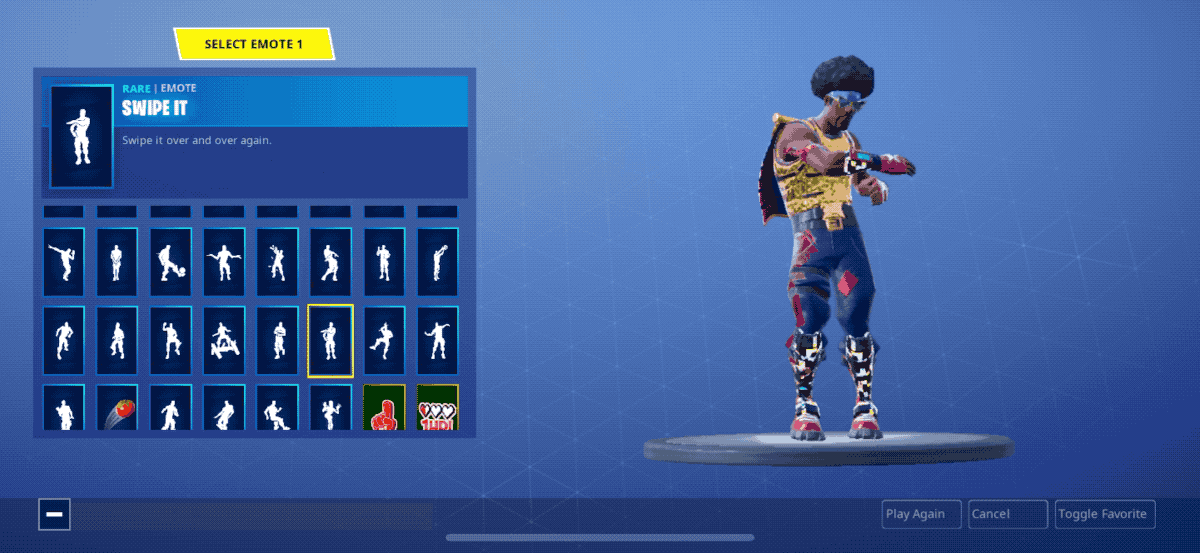Fortnite creator Epic Games is now facing a lawsuit from hip-hop artist 2 Milly, who claims the game developer ripped off his “Milly Rock” dance move by turning it into an in-game emote players can earn after spending real money, according to a report from Variety. The lawsuit was filed in California district court on Wednesday.
The lawsuit marks the first formal legal challenge against the widespread game industry practice of appropriating pop culture, like dance moves and memes, and turning it into virtual items for sale. Though other developers have done this in the past — including Blizzard with World of Warcraft and Overwatch and Bungie with its Destiny series — Epic makes Fortnite, arguably still the most popular game right now and one of the most lucrative titles in the industry. That understandably puts a larger target on its head. (The “Milly Rock” dance has also appeared in NBA 2K18.)
In July 2018, Epic added an emote called “Swipe It” based on the “Milly Rock” featured prominently in the artist’s music 2014 video of the same name. While Epic did not sell the emote directly to players for v-bucks, the Fortnite in-game currency, it did reserve “Swipe It” as an unlockable emote for players who had purchased the game’s $10 seasonal Battle Pass add-on.
“This isn’t the first time that Epic Games has brazenly misappropriated the likeness of African-American talent. Our client Lenwood ‘Skip’ Hamilton is pursuing similar claims against Epic for use of his likeness in the popular ‘Cole Train’ character in the ‘Gears of War’ video game franchise,” David L. Hecht, a partner at the firm representing 2 Milly, Pierce Bainbridge, said in a statement. “Epic cannot be allowed to continue to take what does not belong to it.”

Fortnite has more than 200 million registered players across all platforms, and it generates hundreds of millions of dollars a month. Unlike games that are sold for a flat fee up front, Fortnite is a free-to-play title that makes a majority of its money through cosmetic items, like costumes and the dance emotes. In addition to the “Swipe It” emote, Epic has incorporated popular meme dances, like the floss dance, and other famous moves from prominent music videos, including Snoop Dog’s wheel-turning move from the chorus of “Drop It Like It’s Hot” (called “Tidy” in Fortnite) and BlocBoy JB’s “Shoot” (called “Hype” in Fortnite).
2 Milly’s decision to file a lawsuit comes after prominent voices in the dance and hip-hop communities, including Chance the Rapper, have voiced concern that Epic effectively monetizes the work of black creators without their permission.
Fortnite should put the actual rap songs behind the dances that make so much money as Emotes. Black creatives created and popularized these dances but never monetized them. Imagine the money people are spending on these Emotes being shared with the artists that made them
— Chance The Rapper (@chancetherapper) July 13, 2018
Back in March, actor Donald Faison, who played the character Dr. Chris Turk on Scrubs, wondering aloud on Twitter whether he should be seeking legal advice regarding Fortnite’s default dance being a move he performed in-character on the popular medical-themed comedy.
Dear fortnite... I’m flattered? Though part of me thinks I should talk to a lawyer...
— Donald Faison (@donald_faison) April 1, 2018
Whether a dance move can be copyrighted is largely a settled matter; they cannot, as doing so would largely inhibit the creative expression of dancers. Unlike novels, photographs, and films, replicating a dance move can be done by almost anyone, and popular moves often become building blocks of larger, so-called choreographic works, which are protected by copyright, as outlined in this excellent Insider video breakdown.
In other words, dance steps are like words or colors. You can’t copyright a single one, or even the combination of a few of them in succession (although you can trademark slogans), but you can in fact copyright, say, a ballet.
However, Epic may find itself in uncharted legal territory because of how it takes a popular dance move and gets it into the game. As pointed out by New York Magazine’s Bryan Feldman, 2 Milly’s lawsuit looks like it will focus on Epic’s creative process, particularly the act of using copyrighted music videos to create the animations they use for the in-game emotes.
If it turns out that Epic’s process of creating emotes amounts to tracing, it could get really legally tricky to determine whether infringement has taken place. Tracing over a copyrighted image is generally not an acceptable practice unless all you’re doing is practicing for your own personal improvement.
“Exactly duplicating source imagery probably isn’t legit. (For example, making a photorealistic drawing of a photograph without making any changes.),” writes Kiff Stahle, a photographer and lawyer who runs the blog the artist’s JD. “This would be misappropriation. And likely isn’t fair use even if it was for non-commercial use because there’s no transformation and you remove the possibility of the photographer licensing his photograph for that purpose.”
It’s an open question whether Epic’s animation process is legally equitable to tracing an image, especially if it’s simply using individual frames of a video. There is also the possibility that Epic creates some of its emotes using professional dancers wearing motion-capture suits, which would render moot any legal arguments saying Epic is violating the intellectual property of 2 Milly and his record label. Regardless, this lawsuit will be a fascinating and potentially precedent-setting experiment in how copyright law treats a relatively new and unforeseen type of digital creation.
https://www.theverge.com/2018/12/5/18128115/epic-games-fortnite-sued-lawsuit-rapper-2-milly-dance-move-emoteBagikan Berita Ini














0 Response to "Epic Games is getting sued for turning rapper 2 Milly’s dance into a Fortnite emote - The Verge"
Post a Comment